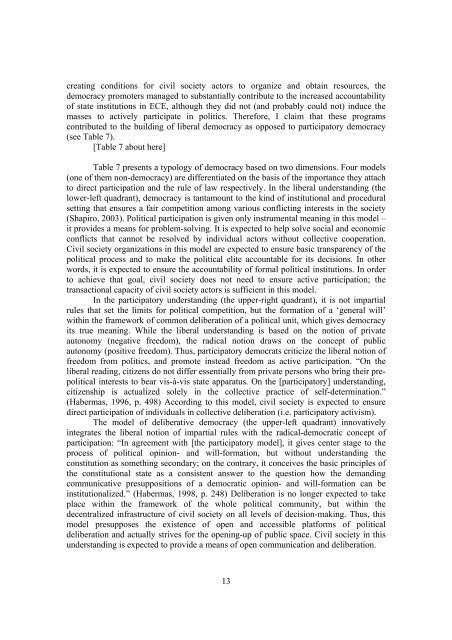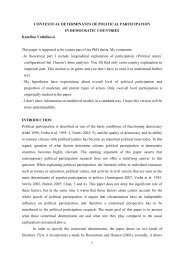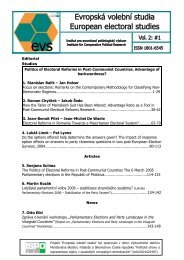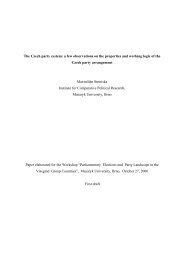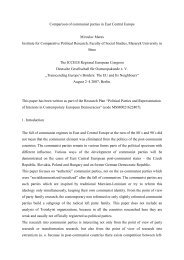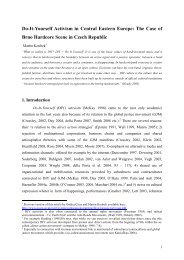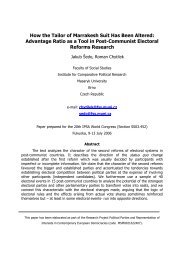Ãvodnà poznámka: PÅedložený text je pracovnà verzà zamýšleného ...
Ãvodnà poznámka: PÅedložený text je pracovnà verzà zamýšleného ...
Ãvodnà poznámka: PÅedložený text je pracovnà verzà zamýšleného ...
You also want an ePaper? Increase the reach of your titles
YUMPU automatically turns print PDFs into web optimized ePapers that Google loves.
creating conditions for civil society actors to organize and obtain resources, thedemocracy promoters managed to substantially contribute to the increased accountabilityof state institutions in ECE, although they did not (and probably could not) induce themasses to actively participate in politics. Therefore, I claim that these programscontributed to the building of liberal democracy as opposed to participatory democracy(see Table 7).[Table 7 about here]Table 7 presents a typology of democracy based on two dimensions. Four models(one of them non-democracy) are differentiated on the basis of the importance they attachto direct participation and the rule of law respectively. In the liberal understanding (thelower-left quadrant), democracy is tantamount to the kind of institutional and proceduralsetting that ensures a fair competition among various conflicting interests in the society(Shapiro, 2003). Political participation is given only instrumental meaning in this model –it provides a means for problem-solving. It is expected to help solve social and economicconflicts that cannot be resolved by individual actors without collective cooperation.Civil society organizations in this model are expected to ensure basic transparency of thepolitical process and to make the political elite accountable for its decisions. In otherwords, it is expected to ensure the accountability of formal political institutions. In orderto achieve that goal, civil society does not need to ensure active participation; thetransactional capacity of civil society actors is sufficient in this model.In the participatory understanding (the upper-right quadrant), it is not impartialrules that set the limits for political competition, but the formation of a ‘general will’within the framework of common deliberation of a political unit, which gives democracyits true meaning. While the liberal understanding is based on the notion of privateautonomy (negative freedom), the radical notion draws on the concept of publicautonomy (positive freedom). Thus, participatory democrats criticize the liberal notion offreedom from politics, and promote instead freedom as active participation. “On theliberal reading, citizens do not differ essentially from private persons who bring their prepoliticalinterests to bear vis-à-vis state apparatus. On the [participatory] understanding,citizenship is actualized solely in the collective practice of self-determination.”(Habermas, 1996, p. 498) According to this model, civil society is expected to ensuredirect participation of individuals in collective deliberation (i.e. participatory activism).The model of deliberative democracy (the upper-left quadrant) innovativelyintegrates the liberal notion of impartial rules with the radical-democratic concept ofparticipation: “In agreement with [the participatory model], it gives center stage to theprocess of political opinion- and will-formation, but without understanding theconstitution as something secondary; on the contrary, it conceives the basic principles ofthe constitutional state as a consistent answer to the question how the demandingcommunicative presuppositions of a democratic opinion- and will-formation can beinstitutionalized.” (Habermas, 1998, p. 248) Deliberation is no longer expected to takeplace within the framework of the whole political community, but within thedecentralized infrastructure of civil society on all levels of decision-making. Thus, thismodel presupposes the existence of open and accessible platforms of politicaldeliberation and actually strives for the opening-up of public space. Civil society in thisunderstanding is expected to provide a means of open communication and deliberation.13


